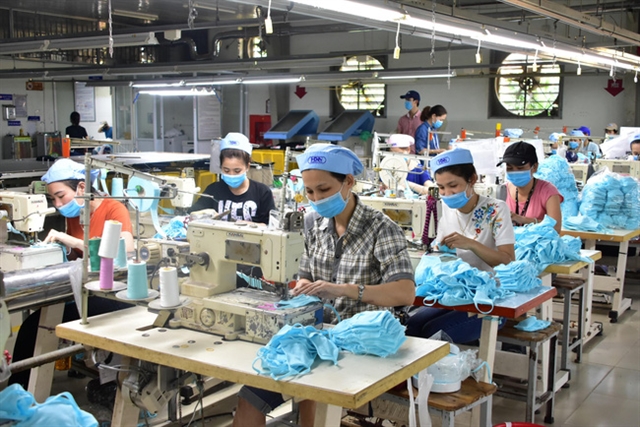 Economy
Economy


|
| Local businesses have received supports from the State during the coronavirus epidemic and the supports would be maintained after the epidemic. Photo baodansinh.vn |
HÀ NỘI – The Ministry of Industry and Trade will continue to support local businesses after the coronavirus epidemic ends, a top official has said.
Minister of Industry and Trade Trần Tuấn Anh made the statement after visits to the Hà Tây Chemical-Weave Co, Ltd, Ltd and the Garment 10 Corporation on Thursday in Hà Nội to study difficulties at local businesses during the novel coronavirus (COVID-19) epidemic.
If the epidemic is controlled in the second quarter, local businesses should take advantage from Q3 at home and abroad and focus resources to resume their business, he said.
He added that the ministry would work to create favourable conditions for local firms.
Since the coronavirus outbreak started, the ministry had evaluated the impacts of the disease on Việt Nam's economic and trade activities and had proposed solutions to other Government bodies to help businesses, he said.
During the ministry’s visit to Garment 10 Corporation, Thân Đức Việt, the company's general director, said the corporation’s major products were shirts, suits and trousers. The epidemic had caused a lack of raw material for those products.
This had led to an interruption in production, he said. Therefore, the corporation’s total revenue this year was expected to fall by 10 per cent against last year while revenue in the first quarter was also estimated to drop by 10 per cent year-on-year.
Nguyễn Thanh Tùng, general director of the Hà Tây Chemical-Weave Co, Ltd, said his company’s main products were vulcanised shoes with a localisation rate of more than 70 per cent, with the remaining raw materials imported mainly from China. The epidemic had forced the company to seek other suppliers at home and abroad.
If the epidemic was prolonged, the firm might run out of material for production, he said.
The minister said, in the long term, Việt Nam needed to develop the support industry for the textile, garment, leather and footwear industries. Local enterprises could not depend solely on raw material imports.
Industrial growth in first quarter
The General Statistics Office (GSO) forecasts if the coronavirus epidemic ends in the first quarter this year, Việt Nam’s industrial production value in the first quarter would increase by 2.68 per cent year-on-year, lower than growth rate of 9 per cent in the first quarter of 2019 and 10.45 per cent in the first quarter of 2018.
Production value of the manufacturing and processing sector, accounting for a large segment in the domestic industrial production, is estimated to increase only 2.38 per cent. If there had been no epidemic, the processing and manufacturing sector was expected to surge by 10.47 per cent.
In addition, other industrial products would also lose production value due to an extended epidemic including textiles, garment, leather and shoes that need imports of raw materials from China such as yarn, fabric, cotton, thread, needle, leather, and other equipment and accessories for the textile, leather and garment sectors.
To stabilise domestic production, GSO director Nguyễn Bích Lâm said the GSO had proposed the Government monitor trade activities, especially key export products and markets, and then solve problems of producers and traders of those products.
In addition, the Government and ministries should support businesses in sectors that had suffered losses from the coronavirus epidemic, especially the textile, leather, electronics, automotive, steel and food processing sectors.
The State should support businesses in getting loans, training workers and expanding distribution systems.
Meanwhile, localities should take recommendations from enterprises to help them during the current difficult time.
According to Minister of Planning and Investment Nguyễn Chí Dũng, localities should implement important public investment projects for local socio-economic development.
The State should focus on improving the business environment to encourage private economic development, he said. - VNS




